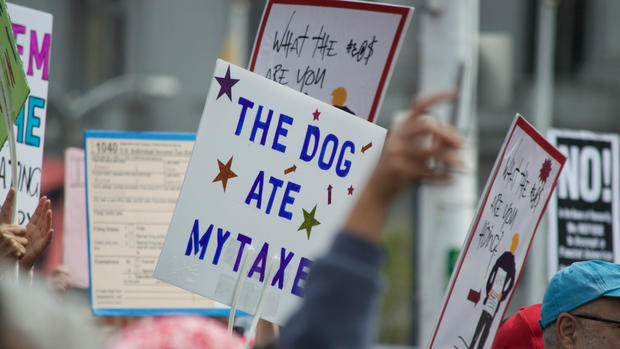
By Tim Shea, Special Contributor | What is the economic impact of taxes?
It’s commonly accepted that San Francisco is one of America’s most progressive cities. Economically, they’ve been a staple of the tech boom for decades. Socially, they’ve championed LGBT issues for even longer. And from a policy perspective, the city boasts a what’s what of trendy, left-leaning reforms. Image Source: https://www.nbcbayarea.com/news/local/Lock-Him-Up-Tax-March-San-Francisco-Draws-Thousands-in-Peaceful-Protest-419547513.html
So, with this illustrious liberal pedigree as the backdrop, it might come as a bit of a shock that the city’s denizens more or less rejected affordable housing and childcare provisions in last Tuesday’s elections. After all, both housing affordability and childcare are hot-button issues for modern progressive. This is doubly true in the chronically unaffordable Bay Area. At least one if not both of the propositions should have been a slam dunk.
Taking a closer look at the actual proposals, however, and it starts to become clear why the new laws failed to pass public scrutiny. First, the two laws were competing with each other; both sought to raise the tax on gross commercial rental receipts, and ultimately only one of them could go into effect. Second, while they may be making a comeback in political circles, taxes on gross receipts have largely fallen out of favor in public policy circles due to a slew of problems such as the undue burden placed on high-cost, low-margin businesses.
And then there’s the small matter of who will actually end up paying the tax. Spoiler: it won’t be the landlords. Despite the fact that they come as ready-made political villains in this story—fat cats getting rich off soaring lease rates as they provide the same exact spaces they did a decade ago—the reality is that vast majority of any new tax on rents will get passed on to the tenants.
In economic parlance, the issue at hand is one of tax incidence. As the theory goes (and this is one of those theories that isn’t really contested), the more inelastic the demand for a good or service, the greater share of the tax paid by the consumer. This is bad news for San Francisco tenants; real estate demand in the Bay Area is about as inelastic as it gets. That means that the true costs of Prop D or Prop C would have been paid not by land lords, but by the tech startups and laundromats and niche restaurants that rent commercial space. It is almost unfathomable to think of a scenario in which this reality did not drastically affect how many San Francisco residents voted in the referendum.
At the same time, it’s hard to not also be sympathetic to the proponents of these two measures. Unlike other recent Golden State public policy measures that we’ve covered, both Prop C and Prop D addressed very real and very immediate concerns for the city. What’s more, when taxing goods and services, inelastic demand is actually what policy makers should seek out if they want to avoid the luxury tax fiasco of the yacht tax fiasco of the 1990s.
Not that this would have brought much comfort to a small business owner as they watched their rent tick up another 3 percent. And that, perhaps, is the lesson community leaders need to take home as they look at how to address social woes within their cities.
ABOUT ANGELOUECONOMICS:
AngelouEconomics has worked with numerous professional and business associations in building dozens of unique economic impact studies among other types of projects including site selection projects as well as strategic economic development projects. Some projects have examined the effects of statewide policy measures, such as the Texas Bathroom Bill or ban on Sanctuary Cities. Other projects have measured the contribution of member networks in terms of jobs, wages, and total economic output. Like this study for Prospera, a nonprofit organization which specializes in providing bilingual assistance to Hispanic entrepreneurs in Florida. Economic impact studies are effective tools for quantifying and illustrating the value of individual professional and business associations. They are versatile, as they can illustrate the value or impact of a specific policy or quantify the economic contribution of your members to the local, regional, and nationwide economies.
Want to Learn More? Email at info@angeloueconomics.com
